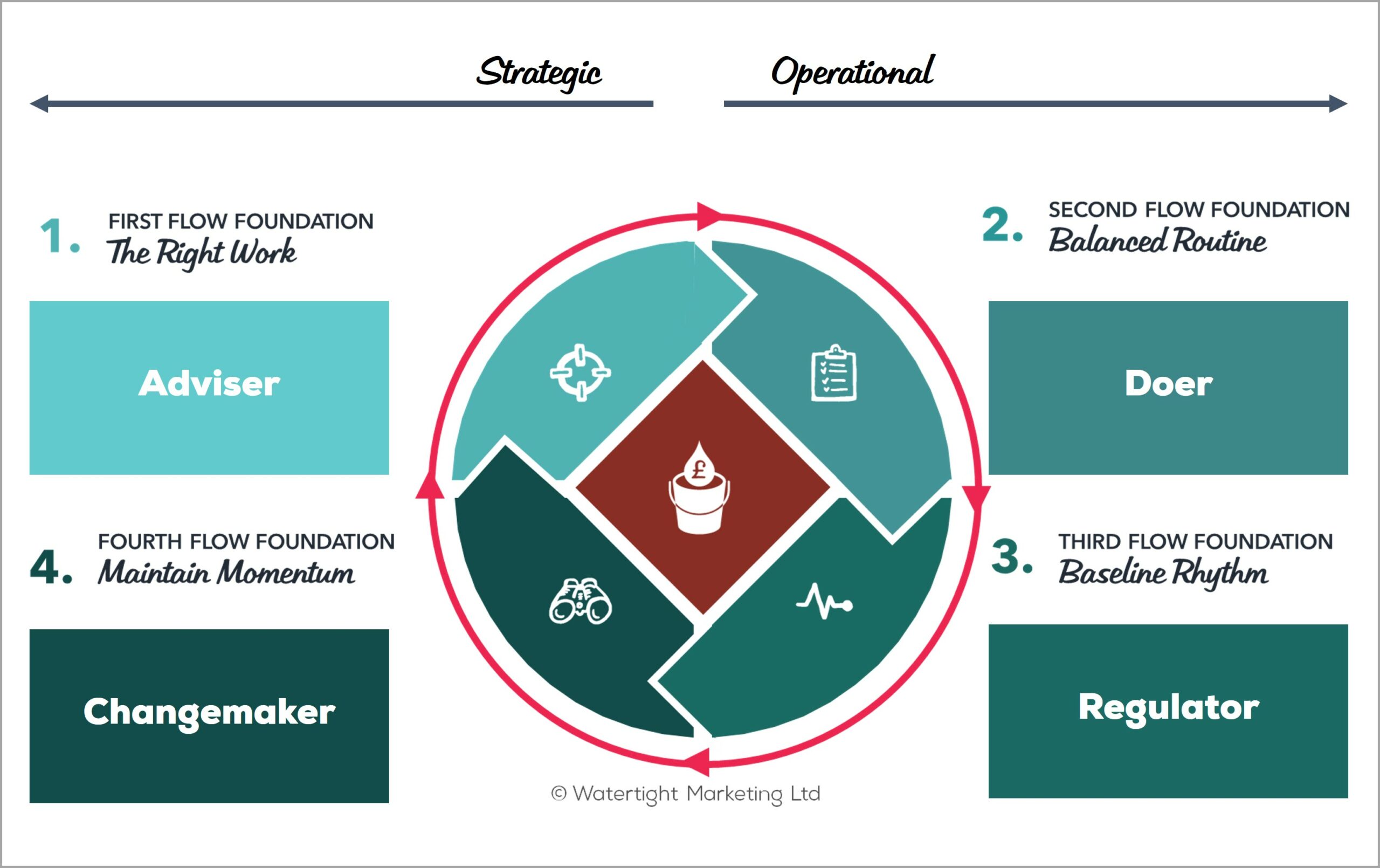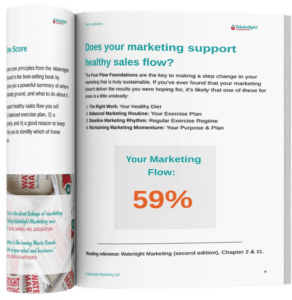Reading Time: 10 Minutes
“Whatever your size of business, recruiting and resourcing can be a tricky. What makes for a brilliant marketing team? What factors do you need to consider? In our roundtable this month we discussed the topic through three lenses – skills, roles and fit – and what people’s experiences were in building that stellar marketing team.” ~ Rachael Wheatley, Managing Director | Watertight Business Thinking
Listen to the session podcast here
49 -minute roundtable discussion on recruiting and resourcing a stellar marketing team.
In resourcing and recruiting there are a host of different factors to consider. To focus the discussion we looked at three themes which served as thought-starters: skills, roles and fit.
How do you assess which skills you need?
First up were skills. The starting point for looking at the mix of skills you need is your business and marketing strategy and plans, including priorities, strategic projects and activity plans. Looking at these, will help you determine what resources you need. The people and skills required will usually be a mix of generalist and specialist, the former being more likely to be the head of marketing or marketing manager overseeing your operation. These are the blue dots in the diagram below.

This generalist will need a expert knowledge of marketing principles and managing an operation, and a good knowledge of the tools available even if they don’t have deep knowledge of each and every marketing technique. Their planning and organisational skill will be excellent, they’ll need a commercial view and financial acumen.
See blog: What skills does a marketing director need to be really effective
(Note: The red dots are senior management level, most of whom do not need to have an in-depth knowledge of marketing, though they do need to know something about what marketing is and the part it plays in supporting the business).
If what you need is someone with deep knowledge of a particular specialism or aspect of marketing, it’s often best to outsource this, unless you have either a larger team or bigger need which might warrant recruiting someone with that knowledge within your team. There are any number of agencies and freelancers who provide SEO, PPC, PR, graphic design and copywriting, which is why it’s often easier to outsource these specialist skills if you need some additional support.
If digital marketing is a real focus, then you might consider recruiting a generalist digital marketer with good overall knowledge and perhaps some experience in one aspect (email marketing) and go out-of-house for deeper knowledge on SEO or PPC for instance or a big campaign. If someone in your team has an eye for design, you could set-up templates in-house and harness that skill by putting them in charge of in-house design, again seeking external resource when needed.
In terms of how a marketing team operates in a business, I have seen it structured in two ways. Firstly as a central marketing team which includes the generalist marketing managers plus people who deliver the services side: activities such as content, events, etc. The second way is for the team to be dispersed through the business where marketing managers work for and within business units. Any central marketing therefore becomes purely a services team.
There are pros and cons to these different structures and how you choose to organise depends on what’s right for your business. That said, resourcing and recruiting factors discussed at the roundtable remain the same.
Laura Davidson: “I’m my firm’s first generalist marketing manager position for a long time and at the moment it’s just me. We’re looking to recruit someone to help me since I’m currently doing strategy and the doing. As a personal preference, I think a generalist is a better foundation for a first, or even second, job. From there you can see whether you’d like to go down a specialist route and whether that might mean moving to a larger team in the future which can accommodate that.”
Becky Wise: “I’m also the first marketing hire and we’re looking to recruit a doer soon. I started as a specialist in a smaller business so I had lots of exposure to other aspects of the business which warmed me towards being more generalist. At the moment I’m juggling too much and don’t have the time to execute what we need to. We’re looking at whether we outsource various projects or we bring someone in-house which I think will be better. What we need is someone to run that regular baseline rhythm, content and consistency with social media which I think will be easier done internally.”
What are the different roles needed in marketing?
We see four roles (or ‘hats’) within marketing, each with a different mindset. Each of these roles aligns with one of our four Flow Foundations.
- The Adviser: Supporting F1, they listen, reflect and provide clear opinion and advice.
- The Doer: Supporting F2, they love nothing better than crossing things off the list.
- The Regulator: Supporting F3, they thrive on process and monitoring.
- The Changemaker: Supporting F4, they are compelled to innovate, shake things up and have the difficult conversations.

In an ideal world, you’d have someone wearing one hat, but most marketers we talk to wear more than one and regularly need to switch! This is sometimes where we see problems in recruiting marketers and often why they leave quickly. They’re recruited as a doer and regulator but are asked to operate at a more strategic level than they have experience for. Or perhaps they are recruited for one job and asked to fulfil two or even three roles. It can be really frustrating, not least because you feel as though you’re inching your way on multiple fronts rather than seeing real progress in a few focus areas.
Whilst you might need to perform more than one role, this model gives you a sense of the type of people and skills, experience and aptitude that are needed to ensure these different areas are really effective. A key question for marketing leaders to ask in shaping their team is: where do our roles fit in to the Flow Foundations and what do we want people in those roles to do and achieve? Ensure your (and their) expectations are clear.
Mark Terrell: “How does motivation fit in here? What I focus on in my work is how people get fulfilled and what drives them so I’m interested in how it relates to your model.”
Rachael Wheatley: “I think it links to the different roles or hats because these relate in part to what motivates you, what kinds of jobs you are drawn to. It also relates to whether you’re a generalist or specialist and what you end up doing in your career. For instance, like many marketers I started off as a generalist, and I’ve stayed there because of what motivates me. Others are more fulfilled by going down specialist routes.”
Mark Terrell: “It’s interesting you say that because there is a specialist motivator in the tool I use. So if you’ve identified someone like that, the idea is to make use of it and make sure they’re skilled up so they have the skills as well as the motivation.”
Rachael Wheatley: “And I guess the trick is to match the role you’re looking to fill with someone who’s motivated in the right way. One of the other things we encourage in recruiting is to make sure companies are positioning themselves, the culture, their vision and values to candidates, because that will be part of the motivation for people to apply for the jobs.”
Mark Terrell: “Yes, and helping them to understand what in their role will motivate them, which they sometimes don’t see. It can be as simple as making a difference or getting recognised for that.”
Juggling these different roles is challenging. Rachael Wheatley: “It is hard to juggle everything when you’re one person and support both the strategic and operational side and wear four hats! That’s when the business needs to decide to invest more in the marketing team so that progress can be made. It also releases people to do what they’re motivated and employed to do.”
There are advantages, however, to wearing multiple hats. Laura Davidson: “Moving from a big to smaller firm, there’s no such thing now as “that’s not my job”. It’s a very lovely firm, but I get dragged into things which I don’t necessarily think I should be doing. However, it does raise my profile and that helps massively with internal marketing.”
How does “fit” fit in?
Fit covers a number of things including:
- How someone fits with your values and culture. More people now are looking to work for companies which have a purpose beyond making money and have clear values they can embrace.
- These values and behaviours need to track through to job descriptions and who/how you recruit, your appraisals, what you expect of people and how they interact.
- The extent to which people work well with the rest of team and fit in – including diversity and different thinking styles.
Dan Bond shared his experience in creating a successful team that fits together well. “One thing that occurred to me whilst you were talking was to do with the size of the business you’re working in and therefore the team you’re hiring. In a small business with our marketing team of three people, realistically we need generalists for the breadth of work we cover. I try to find their strength and where they best fit. In a much larger company you have the luxury of having specialists in-house. For us, we outsource that. Skills can be taught – people are generally motivated to learn. For me, when recruiting it’s more about aptitude and capability and having an interest in marketing. This is where I’ve had most success. The failures have mostly been specialists because you get frustrated that they can’t necessarily think outside that specialism.”
Rachael Wheatley: “That makes me think that in terms of the topic of this roundtable, skills are less important than attitude and aptitude or cultural fit. If that fit isn’t there it can be very disruptive.”
Dan Bond: “An important attribute for us is for people to be resilient and adaptable because our plans do change. And it’s a lot harder to flex if you have recruited specialists in-house rather than outsourcing that.”
Unless there’s support for the marketer, it won’t work
How the marketer interacts with their team-mates and the wider business is critical to the success of the team.
Steve Fordham: “We have a part-time marketing manager who does the doing and the general day to day marketing. What I’m finding is that although I’m not a marketer, I do need to provide the content. It’s alright getting a top-notch marketer in place but unless you support them and contribute, it doesn’t work and would frustrate your marketer. What the marketer does needs to be backed up by everyone else, including at Board level to push things through.
Rachael Wheatley: “What you’re talking to there, Steve, is the need for marketers to liaise with people outside the marketing team, especially if your content is technical in any way. So if a new recruit comes in and only wants to speak to people in the team, their marketing won’t be very effective and they won’t have the requisite skills to succeed. The other skill or ability I think it’s important for any marketer to have is as an internal consultant, serving your internal clients.”
Referring back to the four hats model, Steve Fordham talked about how one of the roles especially needs support and buy-in from the rest of the business: “Thinking about your roles, everyone likes the idea of a Changemaker, but no-one wants to be the Changemaker. Change scares lots of people and how the marketing person brings in that change is a lot to do with the personality of the marketer. And sometimes they need experience of the sector in which the business works to know how best to effect change.”
Rachael Wheatley: “That’s at least in part about credibility and earning your stripes. I think you have to earn the right to challenge people. The business also needs to be up for the change. That’s where I see frustration, where a business doesn’t really want to change – and the marketer who’s been brought in to do just that will walk.”
Steve Fordham: “Yes – there’s a time for consistency and a time when it’s good to have a fresh pair of eyes.”
Watertight Wisdom
What’s worked for us
Ideas from around the room about how to recruit and resource a brilliant marketing team:
- Generalist vs specialist – consider what you need and what will be best outsourced. In all but the largest teams, it’s usually better to recruit a generalist to manage your marketing. If they have a particular interest or skill, utilise that as best you can so they continue to be motivated.
- Decide which role(s) you need – what’s often true is that marketers need to wear more than one hat, especially in smaller businesses. One way or another, however, those four roles need to be fulfilled.
- Manage expectations – Managing yours and others’ expectations is key. You can’t do everything so unless you recruit people to perform other roles, you’ll need to agree priorities. That doesn’t mean you can’t or shouldn’t roll your sleeves up, but you do need to draw some lines otherwise you won’t be meeting your objectives.
- Build a network of trusted suppliers – having a little black book of people you know are good at specialist areas of marketing is invaluable. They’re perfect when you need to some additional resource for specific skills or knowledge.
- Consider your team’s motivations – clearly what drives people is important and harnessing their motivations for their and the business’s purposes will keep them with you for longer.
- Decide if you’re up for change – if what you want is someone to come in with a fresh pair of eyes you need to be prepared for change, and all that entails. Otherwise your marketer will leave pretty promptly!
- Recruit longer on attitude and aptitude – skills can be learned; what can be make or break is the cultural fit and attitude.
- Cultural fit is one of the most important aspects – as with any recruitment, bringing someone in who doesn’t fit with the firm’s vision or values can be very disruptive. Consider how to ensure this is right – seek help from HR colleagues.
What would you add to our list? Do let us know your thoughts.
To join the conversation at our next Watertight Wednesday marketing roundtable you can sign up here. We’ll be having a chin-wag about developing what we call a ‘journey brain’ in the business. We’ll be discussing various journeys (customer, employee, stakeholder), how to map them out and the insight, engagement, mindset and plan needed to make sure they’re fully supported.

Rachael Wheatley
Managing Director, Watertight Thinking
Rachael brings over 30 years’ of marketing experience, with a particular focus on building and developing effective marketing teams that are able to act as a strategic driving force across an organisation. She has worked with Watertight since 2014 as a Master Practitioner and joined the business as MD in 2022.



